- Home
- Georgette Heyer
Devil’s Cub at-2 Page 17
Devil’s Cub at-2 Read online
Page 17
“John says, for revenge,” Léonie answered, looking troubled. “I have a very big fear he may be right.”
Lady Fanny’s china-blue eyes widened. “Good God, my dear, surely even Vidal would not be such a fiend?”
Léonie had gone over to the window, but she turned quickly. “What do you mean—even Vidal?” she snapped. “Oh, nothing, my dear!” said her ladyship hastily. “Not but what it would be the most dastardly thing, and I must say I am thankful my son is not of Dominic’s disposition. I vow my heart positively bleeds for you, my love.”
“And mine for you,” said Léonie with awful politeness.
“Pray why?” demanded her ladyship, preparing for battle.
Léonie shrugged. “For a whole day I have been shut up in a coach with the so estimable John. It is enough, mordieu!”
Lady Fanny arose in her wrath. “I vow and declare I never met with such ingratitude!” she said. “I wish I had sent John to Avon, as I promise you I’d half a mind to.”
Léonie softened instantly. “Well, I am sorry, Fanny, but you said worse of my son than I said of yours, and you said it first.”
For a moment it seemed as though her ladyship would stalk from the room, but in the end she relented, and said pacifically that she would not add to the disasters befalling the family by quarrelling with Léonie. She then demanded to be told how Léonie proposed to avert the gathering scandal. Léonie said: “I do not know, but if it is necessary I will get that girl a husband.”
“Get her a husband?” repeated Fanny, bewildered. “Who is he to be?”
“Oh, anyone!” Léonie said impatiently. “I shall think of something, because I must think of something. Perhaps Rupert will be able to help.”
“Rupert!” almost snorted her ladyship. “As well ask help of my parrot! There’s nothing for it, my dear; you will have to tell Avon the whole.”
Léonie shook her head. “No. Monseigneur is to know nothing. I cannot bear it if there is to be more trouble between him and Dominique.”
Fanny sat down limply. “I could shake you, Léonie; I vow I could! Avon will be in town again by the end of the week, and when he finds you and Rupert gone off together he’ll come to me, and what, pray, am I to tell him?”
“Why, that I have indeed gone to Cousin Harriet.”
“And Rupert? A likely tale!”
“I do not think that he will know whether Rupert is in London or not—or care.”
“Take my word for it, child, he will know. And I’m to embroil myself in this affair, if you please! I won’t do it!”
“Fanny, you will!—Dear Fanny?”
“I’m too old for these wild coils. If I do, I shall tell Avon I know nothing about you or Rupert or anyone. And you may inform Vidal from me that the next time he abducts a young female he need not come to me for aid.” She got up, and began to look for the hartshorn. “If you dare to bring Rupert here I shall have an attack of the vapours.” She went out, but a moment later put her head in at the door to say:
“I’ve a mind to come with you. What do you think, my love?”
“No,” said Léonie positively. “If Monseigneur finds us all gone he would think it very odd.”
“Oh well!” said Fanny. “At least I should not have to face him with a mouthful of lies, which of course he will see through. However, If you are set on going with Rupert I’d as soon stay at home.” She disappeared again, and Léonie picked up her hat, and once more tied it over her curls.
She took a chair to Half Moon Street, and was fortunate enough to find his lordship at home. Lord Rupert greeted her jovially. “I thought you were in Bedford, m’dear. Couldn’t stand it, eh? I told you so. Devilish dull is old Vane.”
“Rupert, the most dreadful thing has happened, and I want you to help me,” Léonie interrupted. “It’s Dominique.”
Lord Rupert said testily: “Oh, plague take that boy! I thought we’d got him safe out of the country.”
“We have,” Léonie assured him. “But he has taken a girl with him!”
“What sort of a girl?” demanded his lordship.
“A—a hussy! A—I do not know any word bad enough!”
“Oh, that sort, eh? Well, what of it? You ain’t turning pious, are you, Léonie?”
“Rupert, it is most serious. He meant to elope with the bourgeoise, and oh, Rupert, he has taken the wrong sister!”
Rupert stared at her blankly. “Taken the wrong sister? Well, I’ll be damned!” He shook his head. “Y’know, Léonie, that boy drinks too much. If this don’t beat all!”
“He wasn’t drunk, imbécile! At least,” added Léonie conscientiously, “I do not think he was.”
“Must have been,” said his lordship.
“I shall have to explain it all to you.” Léonie sighed.
At the end of her explanation his lordship gave it as his opinion that his nephew had gone stark, staring mad. “Does Avon know?” he asked.
“No, no, not a word! He must not, you understand, and that is why we are going to France at once.”
His lordship regarded her with profound suspicion. “Who’s going to France?”
“But you and I, of course!” Léonie replied.
“No, I’m not,” stated Rupert flatly. “Not to meddle in Vidal’s affairs. I’ll see him damned first, saving your presence.”
“You must,” Léonie said, shocked. “Monseigneur would not at all like me to go alone.”
“I won’t,” said Rupert. “Now, don’t start to argue, Léonie, for God’s sake! The last time I went to France with you I got a bullet in my shoulder.”
“I find you ridiculous,” Léonie said severely. “Who is to shoot bullets at you now?”
“If it comes to that, I wouldn’t put it above Vidal, if I go meddling in his concerns. I tell you I won’t have a hand in it.”
“Very well,” Léonie said, and walked to the door.
Rupert watched her uneasily. “What are you going to do?” he asked.
“I am going to France,” said Léonie.
His lordship requested her to have sense; she looked wood-enly at him. He pointed out to her the extreme folly of her behaviour; she yawned, and opened the door. His lordship swore roundly and capitulated. He was rewarded by a beaming smile.
“You are very kind to me, Rupert,” her grace said enthusiastically. “We will go at once, do you not think? For I am late already, five days.”
“If you’re five days behind that young devil you’re too late altogether, m’dear,” said his lordship sensibly. “Lord, Avon will murder me for this!”
“Of course he will not murder you!” said Léonie. “He will not know anything about it. When shall we start?”
“When I’ve seen my bankers. Ill do that in the morning, and I only hope the fellows don’t take it into their heads I’m flying the country. We can catch the night packet from Dover, but don’t bring a mountain of baggage, Léonie, if you want to travel fast.”
The Duchess took him at his word, and when his coach arrived in Curzon Street next morning she had only one band-box to be put into it. “You can’t travel like that!” he protested. “And ain’t you taking your abigail along too?”
She rejected the suggestion with scorn, and pointed an accusing finger at the baggage already piled on the roof of the coach. After a lively dispute, in which Lady Fanny and her son joined, two of Lord Rupert’s trunks were left behind in his sister’s charge. An errand-boy, two loiterers, and a cook-girl were interested spectators of the start, and Mr. Marling delivered a lecture, which no one paid any attention to, on the amount of baggage he himself considered necessary for a gentleman to take to Paris.
When the coach at last moved forward Lady Fanny announced that she had the migraine, and went off upstairs, leaving Mr. Marling to order the disposal of the two trunks left on the pavement.
She expected to see his grace of Avon within three days. She saw him within two, greatly to her dismay. When his name was announced she was reclining on a co
uch in her withdrawing-room, her hands encased in chicken-skin gloves (for an east wind had slightly chapped their soft whiteness), yawning over the pages of The Inflexible Captive. She gave a perceptible start, but recovered herself in an instant, and greeted his grace with apparent delight.
“La, Justin, is it you indeed? I’m vastly glad to see you. Only look at this book that John has given me! It is writ by by that Bluestocking, Mrs. More. I find it amazingly dull, do not you?”
His grace came over to the fire, and stood looking enigmatically down at her. “Amazingly, my dear Fanny. Do I see you in your customary good health?”
Lady Fanny promptly launched into a recital of the many ailments that afflicted her. It was a fruitful topic, and his grace evinced enough polite interest to encourage her to enlarge on it. She enlarged for twenty minutes and discoursed on Dr. Cocchi’s book, The Pythagorean Diet, or Vegetables only conducive to the Preservation of Health and the Cure of Diseases. His grace was urbanity itself. Lady Fanny quaked inwardly, and began to falter in her account of her indisposition. A short pause ensued. His grace took snuff, and as he shut his elegant gold box said languidly: “I understand, my dear Fanny, that there is to be a marriage in our family.”
Lady Fanny started upright on the couch. “A—a marriage?” she stammered. “Why—why—what do you mean, Justin?”
His grace’s brows rose a little; she thought there was a gleam of malice in his eyes. “Doubtless I have been misinformed. I was under the impression that my niece is about to espouse a gentleman of the name of Comyn.”
“Oh!” gasped her ladyship, quite faint with relief. She sank back upon her cushions. “Of course she’ll do no such thing, Justin. Why, have you forgot that I’ve sent her to Paris to be out of the unfortunate young man’s way?”
“On the contrary, I understood that you sent her there to prevent a mésalliance.”
“Well, but—but so it is!” said Fanny, taken aback.
His grace flicked a speck of snuff from his sleeve. “I should inform you, my dear sister, that the marriage has my support.”
Lady Fanny felt for her vinaigrette. “But I won’t have it! He’s a nobody, Justin! I intend her to make a far better match. I made sure you would dislike it excessively. Pray, what in the world has come over you? You’ve never set eyes on young Comyn.”
“I hesitate to contradict you, Fanny,” said his grace politely, “but you will perhaps allow me to be not yet in my dotage. I have met and approved Mr. Comyn. He seemed to be a young gentleman of considerable presence of mind. I am only surprised that he should wish to ally himself with my niece.”
Lady Fanny took a sniff at her salts, and regained strength enough to say: “I suppose you have gone mad, Justin. Let me tell you that I have every hope that Juliana will wed Bertrand de Saint-Vire.”
His grace smiled. “I fear, my dear Fanny, that you are doomed to disappointment.”
“I don’t know what you mean, and I’m sure I don’t desire to!” said her ladyship pettishly. “I might have guessed you would be monstrous disagreeable! And if you are come home early from Newmarket only to encourage Juliana in her waywardness I think it quite abominable of you,”
“Pray calm yourself, Fanny; I am about to relieve you of my presence. You will no doubt be glad to learn that I am leaving London to-night.”
Lady Fanny eyed him in considerable trepidation. “Oh indeed, Justin? May I ask where you propose going?”
“Certainly,” replied his grace blandly. “But surely you have guessed?”
Lady Fanny stammered: “No—yes—pray, how should I guess? Where are you going?”
His grace moved towards the door. His eyes mocked her. “But to Cousin Harriet, my dear. Where else should I go?” He bowed, while she stared at him in mingled horror and suspicion, and before she had time to collect her wits, the door had closed behind him.
Chapter XII
Miss Marling heard that her dearest Mary was intending to become a governess she had the wit to keep her dismay to herself. It did not take the lively damsel long to discover the whole state of Mary’s mind, and having discovered it she became instantly resolved on Miss Challoner’s marriage to the Marquis. She lent a kind but disbelieving ear to Mary’s steadfast disavowal of the tender passion, and when asked to aid her friend in the search for a genteel family, said frankly that she knew of none. Mary, with only a few borrowed guineas in her pocket, found that she was as much in Vidal’s power as she had ever been, and since she feared that to take Tante Elisabeth into her confidence would lead only to her instant expulsion from the house, she threw herself on Juliana’s mercy, and begged her to save her from Vidal. To be cast to the street in a foreign city was a fate from which even the redoubtable Miss Challoner shrank. She had a feeling that she was fighting in the last ditch, and when her appeal to Juliana was unavailing, there seemed to be no hope left of holding his lordship at arm’s length.
Juliana, with a worldly wisdom learned no doubt from her mamma, pointed out the advantages of the match. She had no doubt, she said, that Vidal would make an odious husband, but Mary would be amazingly stupid not to take him, for more than half the dowagers in London wanted him for their own daughters.
Mary said unhappily: “I’ve begged you—I’ve prayed you to help me escape from this net Do you care for me so littler
“I love you so much I’m quite delighted to think yon are to be my cousin,” responded Miss Marling. She embraced Mary warmly. “Truly, my dear, I daren’t smuggle you out of the way. I’ve promised Vidal I won’t, and even if I did he would find you in a trice. What shall you wear at the ball to-night?”
“I dont go,” Mary said in a flat voice.
“Good gracious, Mary, why not?”
“I am in your cousin’s house under false pretences,” Mary said bitterly, “she would not take me to these parlies if she knew the truth.”
“Well, she don’t know it,” replied Juliana. “Do come, my dear: Vidal will be there.”
“I have no desire to meet his lordship,” said Mary, and would say no more.
Mme. de Charbonne, the most easy-going of dames, made no more objection to Mary’s remaining at home than she had made to her sudden arrival two days before. Mary had told her, in desperation, that she was under the necessity of earning a living for herself, and it was plain that madame—who upon hearing this news had regarded her young guest as a kind of rara avis—considered that balls must certainly be out of place for indigent young females. Upon being asked if she could recommend Miss Challoner to a suitable family she had said vaguely that she would bear it in mind, which did not sound particularly hopeful.
Having seen Juliana arrayed for her party in a rose-pink taffeta gown trimmed with chenille silver and spread over immense elbow-hoops; her hair dressed in her favourite Gorgonne style by no less a personage than M. le Gros himself; her person scented with cassia, Miss Challoner bade her farewell and prepared to spend a quiet evening in one of the smaller salons. She intended to apply herself seriously to the problem of escape, but in this she was frustrated by the appearance, not half an hour after Madame de Char-bonne’s and Juliana’s departure, of Mr. Frederick Comyn.
She had already met Mr. Comyn once since their unfortunate encounter at Dieppe, and she supposed that he was apprised of her situation. His manner was extremely respectful, and she thought that she could detect a certain grave sympathy in his gaze.
When the lackey ushered him into the salon she rose, and curtsied to him, and perceived as she did so that his firm mouth was rather tightly compressed. He bowed to her, and said, more as a statement than a question: “You are alone> ma’am.”
“Why yes,” she answered. “Were you not informed at the door, sir, that Miss—that Madame is gone out to-night?”
Mr. Comyn said with a touch of gloom: “Your first premise was correct, ma’am. It is not Madame de Charbonne that I came hoping to see, but Miss Marling. I was indeed informed that she was gone out, but I ventured to inquire for yours
elf, ma’am, believing that you would be able to oblige me by divulging Miss Mailing’s present whereabouts.”
Miss Challoner begged him to be seated. She had a shrewd notion that all was not entirely well between Miss Marling and her swain. Certain veiled remarks and flighty head-toss-ings on the part of Juliana had induced her to suppose that Mr. Comyn had somehow affronted his lady. She now perceived that Mr. Comyn wore the air of a man goaded beyond the limits of forbearance. She would have liked to give him some good advice on the proper way of treating Miss Marling, but feeling that their intimacy was not far enough advanced to permit of this, she merely replied: “Certainly, sir. Miss Marling is gone to a ball at the house of—I think—Madame de Saint-Vire.”
She instantly realized from his expression that her frankness was ill-timed. A crease appeared between his brows; there was a distinct grimness in his face, which Miss Challoner privately thought became him rather well. “Indeed, ma’am?” he said levelly. “It is as I suspected, then. I’m obliged to you.”
He seemed to be on the point of departure, but Miss Challoner ventured to stay him. “Your pardon, Mr. Comyn, but I think you are put out?”
He gave a short laugh. “Not at all, ma’am. I apprehend that I am merely unaccustomed to the manners obtaining in the Polite World.”
“Will you not take me a little way into your confidence, sir?” Mary said gently. “Juliana is my friend, and I believe I may say I do in part understand her. If I could be of assistance to you—but I do not wish to appear vulgarly intrusive.”
Mr. Comyn hesitated, but the kindness in Miss Challoner’s face induced him to come back into the room, and sit down on a chair beside her. “You are very good, ma’am. I believe it is not unknown to you that there exists between Miss Marling and myself a contract to wed, which, though unhappily a secret from the world, I at least have regarded as binding.”
“Yes, sir, I know, and I wish you very happy,” said Mary.
“Thank you, ma’am. Before I set foot in this town—a circumstance I am fast coming to regret—I should have received your extremely obliging good wishes with a gratitude unalloyed by misgiving. Now—” He stopped, and Miss Challoner watched the meticulous gentleman merge into an angry and scowling young man. “I can only suppose, ma’am, that Miss Marling has, upon reflection, perceived the force of her parent’s arguments, and decided to bestow her hand elsewhere.”

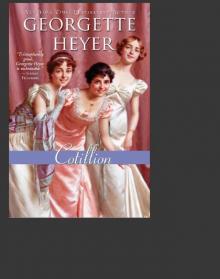 Cotillion
Cotillion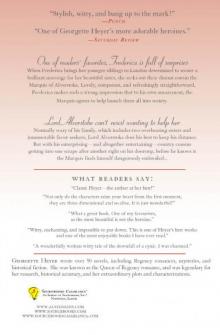 Frederica
Frederica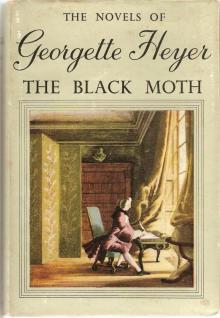 The Black Moth: A Romance of the XVIIIth Century
The Black Moth: A Romance of the XVIIIth Century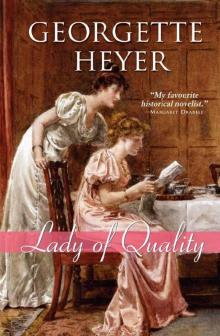 Lady of Quality
Lady of Quality Snowdrift and Other Stories
Snowdrift and Other Stories An Infamous Army
An Infamous Army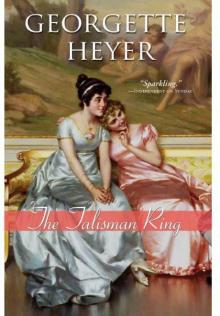 The Talisman Ring
The Talisman Ring Venetia
Venetia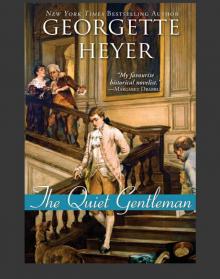 The Quiet Gentleman
The Quiet Gentleman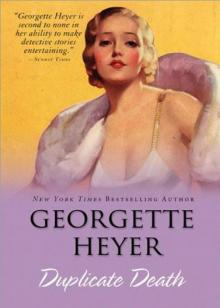 Duplicate Death
Duplicate Death Cousin Kate
Cousin Kate Black Sheep
Black Sheep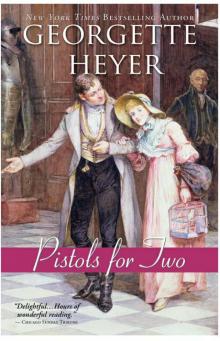 Pistols for Two
Pistols for Two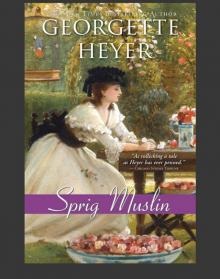 Sprig Muslin
Sprig Muslin No Wind of Blame
No Wind of Blame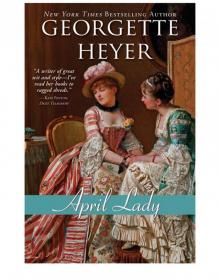 April Lady
April Lady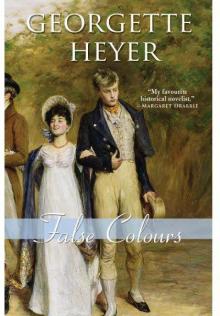 False Colours
False Colours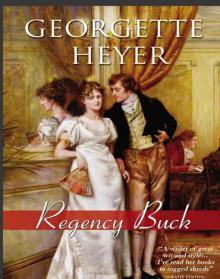 Regency Buck
Regency Buck The Toll-Gate
The Toll-Gate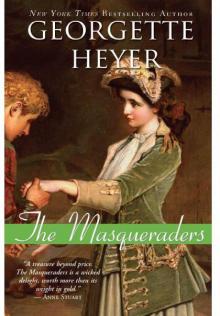 The Masqueraders
The Masqueraders The Unknown Ajax
The Unknown Ajax The Grand Sophy
The Grand Sophy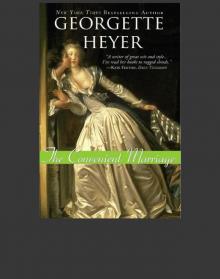 The Convenient Marriage
The Convenient Marriage Faro's Daughter
Faro's Daughter The Conqueror
The Conqueror The Foundling
The Foundling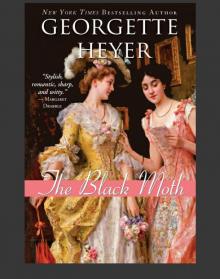 The Black Moth
The Black Moth The Transformation of Philip Jettan
The Transformation of Philip Jettan Friday's Child
Friday's Child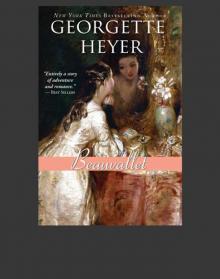 Beauvallet
Beauvallet They Found Him Dead
They Found Him Dead Charity Girl
Charity Girl Death in the Stocks: Merely Murder
Death in the Stocks: Merely Murder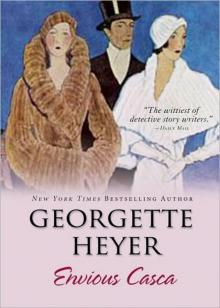 Envious Casca
Envious Casca Behold, Here's Poison
Behold, Here's Poison Arabella
Arabella The Nonesuch
The Nonesuch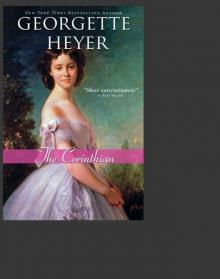 The Corinthian
The Corinthian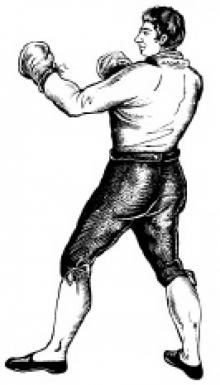 Jennifer Kloester
Jennifer Kloester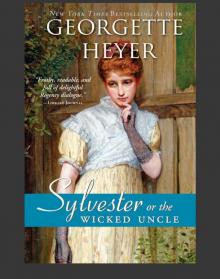 Sylvester
Sylvester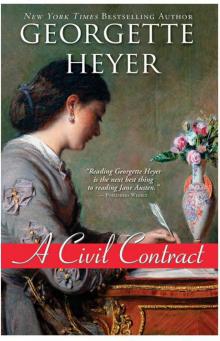 A Civil Contract
A Civil Contract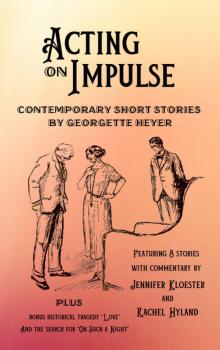 Acting on Impulse
Acting on Impulse Devil’s Cub at-2
Devil’s Cub at-2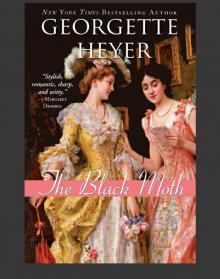 Black Moth
Black Moth Grand Sophy
Grand Sophy Instead of the Thorn
Instead of the Thorn Masqueraders
Masqueraders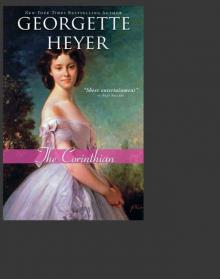 Corinthian
Corinthian Reluctant Widow
Reluctant Widow